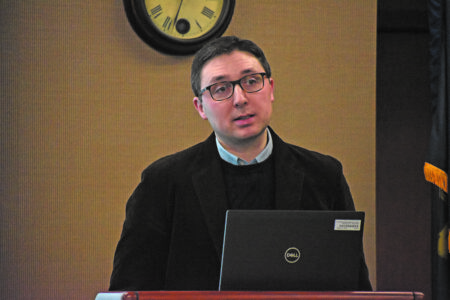Township weighs in on water
Public use of Greenland well still at issue
GREENLAND TOWNSHIP — The Greenland Township Board in a Friday release stated its elected officials have been actively working with the Michigan Department of Natural Resources and others, in an attempt to retain public use of an artesian well located in Lake Mine since October 2021.
“Now, the MDNR has announced that well will be closed as of February 6,” the release states. “That information came by way of a news release distributed directly to the media.”
The well, located on state land, has been used for many years by both the local population and visiting tourists, the release says. For more than a year, Greenland Township has been committed to transferring ownership to their local jurisdiction. They say those efforts will continue.
The township said it is committed to working with MDNR officials, along with state Rep. Greg Markkanen and Sen. Ed McBroom, in resolving the impasse created by the order issued by the Michigan Department of Environment, Great lakes and Energy to the MDNR restricting the public from accessing the artesian well and the eventual abandonment and plugging of this natural resource.
The township also stated that despite the sudden, unexpected announcement from EGLE and MDNR, the township is resolved in returning to a positive dialog with the agencies in order to arrive at an amicable solution to benefit all parties and preserve a rare natural resource for generations to come.
However, in a statement Thursday from the DNR, deputy public information officer John Pepin said that the DNR has been granted an extension until Feb. 24 before being required to shut down what EGLE is calling an “unregulated roadside water source.”
A letter to Tom Seablom, Supervisor, Western Upper Peninsula District of the DNR, from EGLE dated Feb. 1 states, in part, that:
If the Department of Natural Resources (DNR) would like to request an additional extension of this deadline, the Department of Environment, Great Lakes, and Energy (EGLE) would be open to approving an additional 120 days provided the DNR commits to the following actions while the well remains accessible to the public:
1. The DNR maintains signage in plain view of anyone accessing the well that indicates the water is not for potable use. The DNR would need to consult with the local health department (LHD) to define the specific text that should be included on the sign. Because vandalism has affected signs previously posted, the DNR would need to routinely verify that the signage remains in place.
2. The DNR works with the LHD to publicly communicate the health concerns associated with the water and why it should not be used for potable purposes.
The letter goes on state that EGLE appreciates the DNR’s efforts to address the risks caused by this well to individuals that have been accessing it for their personal use. The specific health concerns EGLE has with the well are detailed below:
• The illegal well/source pipe (pipe into the hillside) is not properly constructed into a protected aquifer. The source has not been definitively identified. It is possible that an old mine is the source. If that is correct, it would most likely have highly fractured rock or other direct conduits (bore holes or shafts) that allows contaminated surface water to directly recharge the source water in the mine. The naturally protective geological barriers that protect groundwater from surface water contamination most likely were eliminated through historical mining activities. Historical mining activities also potentially contaminated the water in this mine. This situation is commonly referred to as groundwater under the direct influence (GWUDI) of surface water which requires it to be treated as surface water.
• GWUDI of surface water is not safe to drink, wash, or prepare food without proper treatment of the source water to protect against pathogens. Untreated GWUDI of surface water is subject to microbiological contaminants such as viruses, bacteria, and protozoa which can be human pathogens; some of these pathogens cannot be sampled. Surface water supplies need to provide full treatment to remove or inactivate these pathogens and are required to maintain a detectable disinfectant residual throughout the entire distribution system. Other potential contaminants regulated under the Michigan Safe Drinking Water Act, 1976 PA 399, as amended, have not been evaluated.
• Additionally, the hoses used, the handling of these hoses, and the method for filling containers are also critical concerns. The hoses create additional pathways for water contamination that could harm people if they ingest this water.
In its Friday statement, Greenland Township stated it has continued to advocate the safety of the drinking water by offering to conduct regular testing of the water in addition to the tests currently administered by MDNR personnel and the Western Upper Peninsula Health department.
“According to reports,” the statement says, “current and past water testing has indicated the water meets or exceeds current Michigan drinking water standards.”
To date, the release said, the township board has not been officially notified of the impending closure by any state agency.
Attempts to reach the Greenland Township office Friday were unsuccessful due to technical difficulties. Pepin also could not be reached as of deadline Friday.






